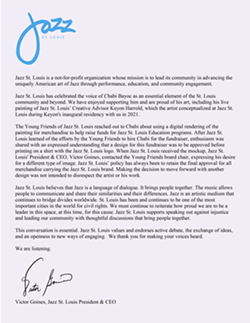
The first outward sign of the trouble at Jazz St. Louis appeared on Instagram on April 19.
Cbabi Bayoc, a St. Louis-based artist, posted a photo of himself with his fist raised. In his other hand, he held a painting depicting a Black youth holding a trumpet in one hand, with the other raised in a similar gesture to Bayoc.
In the post, Bayoc wrote about the painting, which is based on Keyon Harrold, Jazz St. Louis’ creative advisor and a well-regarded young jazz performer. Bayoc had painted it live as Harrold performed at Jazz St. Louis in October 2021, and when Bayoc was asked to create a T-shirt for Cocktails for a Cause, a Young Friends fundraiser for Jazz St. Louis scheduled to take place on April 26, it made sense to use the painting.
But within days, Amber Howlett-Bayoc, Bayoc’s manager and wife, was informed by a Young Friends board member that Jazz St. Louis’ President and CEO Victor Goines had rejected the design.
On Instagram, Bayoc wrote that he and his wife had been told that three white board members expressed unease with the image. Bayoc wrote that he’d been told that Goines had said something like, “I will not support the image as empowerment and solidarity because all lives matter and dollars that support Jazz St. Louis can’t be offended on my watch.”
Bayoc also wrote that a member of the Young Friends board said that Goines later denied offering that rationale, instead saying that the proper protocols hadn’t been followed in selecting the design.
Whatever the reason, Bayoc’s painting was out, and his post was up. Within hours, it garnered thousands of likes and comments from supporters.
Meanwhile, Jazz St. Louis roiled internally. The Bayoc incident and its fallout is only the latest in a string of incidents that has employees and supporters unhappy with Goines as a leader. There have been questions about his hiring, a touring schedule that kept him out of the office, his domineering attitude in the office, his attitudes toward women and non-binary individuals, and his temperament.
Goines did not return a call seeking comment and indicated this morning that he had no comment on a detailed list of allegations provided by the RFT.
Goines, a longtime member of the Jazz at Lincoln Center Orchestra and the Wynton Marsalis Septet, began his tenure at Jazz St. Louis last September. Earlier that year, he’d retired from a job directing jazz studies at Northwestern University. Previously, he’d been the artistic director of Juilliard’s jazz studies program.
He replaced longtime Jazz St. Louis President and CEO Gene Dobbs Bradford, who had left in the spring of 2022 after more than 23 years at the nonprofit to head up the Savannah Music Festival in Georgia. During Bradford’s tenure, he grew the organization's annual budget from $300,000 to $3 million and introduced a host of educational programs. He also led the campaign to renovate the nonprofit’s building, which reopened as the Harold and Dorothy Steward Center for Jazz in 2014.
Bradford was only the organization’s second leader. Barbara Rose and Peter Bunce founded what was then called Jazz at the Bistro in August 1995 in order to present musicians in an intimate setting. It later became the nonprofit organization Jazz St. Louis, which has a mission “to lead our community in advancing the uniquely American art of jazz through performance, education, and community engagement.”
When Goines was announced as Bradford’s replacement last year, right away, some wondered about his appointment.
“There were kind of some whisperings from the beginning that the process was set up, and that there were some exceptions made for him to join as a CEO,” says Sherry Nelson Thomas, who was, until recently, a Jazz St. Louis Young Friends board member.
An advisory board, the Young Friends of Jazz St. Louis is made up of individuals under 45 who serve as ambassadors to the community, support the organization’s development efforts to fund education programs and select six shows for a package subscription. It’s different from the Jazz St. Louis board of directors, which is the governing body of the nonprofit. That board has 28 members, including two emeritus members, listed on its website currently. More than 60 percent appear to be white while the Young Friends board and leadership, Nelson Thomas says, until recently was mostly people of color.
Last September, Goines told the RFT that he had been clued onto the position by a childhood friend, jazz great Marsalis, and that he intended to build up Jazz St. Louis. Yet some people questioned why someone with such an impressive pedigree would even be interested in St. Louis.
“For me it was a red flag of, ‘Why is he 62 years old and having a really nice job at Northwestern and suddenly leaving that to come here? It didn't really compute in my mind,” says a Jazz St. Louis employee who spoke with the RFT on condition of anonymity for fear of reprisal.
Both the employee and Nelson Thomas say that Goines was largely absent when he started the position because he was traveling as a musician. Nelson Thomas says she gave him the benefit of the doubt at first.
As time went on, the employee says, Goines was “very frustrating and difficult” to work for and constantly sought to be in control of everything.
“He has demonstrated poor leadership to the point where in January, February of this year, people were concerned that he would ultimately be a liability for the organization because of things that he would say,” the employee says.
One of those instances came at a monthly group birthday celebration that Jazz St. Louis regularly holds, when staffers gather for cake and to chat. The employee says Goines brought up sexual harassment training that he’d gone through at Juilliard and at Jazz at Lincoln Center Orchestra.
The man who ran the training supposedly said he didn’t want his daughter to worry about being sexually harassed.
“Victor said he asked, ‘Well, what about your son?’ And then he clarified … ‘What about when your son gets wrongfully accused, what protections are there for him?’ and said that ‘You need to rewrite this sexual harassment policy so that it protects men,’” the employee says. “And then he made a remark saying that it's OK for women to wear whatever they want. But, ‘Why do I have to get in trouble for looking at them?’”
Goines seemed to display a similar attitude toward women in a recording that the RFT obtained of a February 8 meeting to discuss a collaboration with the New York-based Women in Jazz Organization, or WIJO. The idea was to host a celebration of women in jazz.
The recording, which is an hour and 17 minutes, begins after the meeting has started and opens with the group discussing the budget. Goines expresses reluctance to go to donors for the event, saying that he doesn’t “want them to feel like an ATM machine.”
Instead, he proposes not paying the women musicians. “As artists, you all have to put some skin in the game as women, other than just your intellectual thought to plan this thing out,” he said at one point.
Another person in the room replied, “I would just say that it doesn't make sense in terms of optics to have an event endorsing women in jazz and offering them greater opportunities and not pay them. The optics on that are just pretty terrible, in my opinion.” The person also pointed out that women are a “historically underpaid section of society.”
Another person in the meeting agreed. “That’s not a celebration of women in jazz, and that’s not promoting equity in gender in jazz.”
Goines replied, “So if I pay you, that’s going to make it all good?” At one point, he asked, “What number makes women feel treated fairly to be paid?”
“You’re kind of being a bully right now, which is really not appreciated,” one of the attendees said.
Toward the end of the conversation, Goines brought up part of WIJO’s mission, which is to support non-binary people. “Some of my best friends are women musicians … this thing is to invite women and non-binary people, right? Now, in order to ask a question, I got to kind of get out of context because a non-binary person can be someone who didn’t necessarily be born as a female. So how does that apply to the [indecipherable]?”
Goines mentioned a non-binary individual he knew while teaching at Northwestern who had first dressed as male presenting but transitioned to female presenting.
“Who could be in the room at the time and not be quote, unquote, a female?” he asked, later adding, “I would like to believe that we can get all the most sincere people in the world coming to this event … I’m trying to see everything that could come to us so that when we in the room, we can best defend women in jazz and defend Jazz St. Louis.”
Bayoc came to Jazz St. Louis through Harrold. The two men had met while recording a podcast during the pandemic and bonded because they showed up wearing the same shirt. Bayoc is a prominent artist (in addition to high-profile murals and commissions throughout the metro and beyond, he recently illustrated Ibram X. Kendi’s Goodnight Racism), so at some point Harrold asked him to paint something for Jazz St. Louis.
The painting he produced follows a common form in Bayoc’s work. Throughout his Midtown studio, just down the street from Jazz St. Louis, are paintings of young Black people with their fists raised. The images, which Bayoc began painting in the wake of Michael Brown’s killing and a protest on South Grand Boulevard in 2014, are bright and colorful.
“Movements are youth-driven,” Bayoc says. “This is about kids fighting for the life that they want to live.”
Initially, the painting seemed to get a good response from the organization, and Bayoc and Nelson Thomas, the Young Friends board member, say it was used on social media accounts in 2021.
The artwork was made at the end of Bradford’s tenure, and he says that it was arranged by a different staff member.
“I was really happy to have Cbabi because he does so much in the community,” Bradford says. “I was really excited about that. … He’s a great artist and very much part of the St. Louis art scene.”
Bayoc had previously done work for free for Jazz St. Louis, but Howlett-Bayoc told the organization it needed to compensate him this time because there were fixed costs involved in creating the T-shirt design. Because it was a fundraiser, she and Bayoc settled for a fee that was less than one-third of what they’d normally charge, which they were told a private donor had covered.
After Bayoc created a mockup, the response from the Young Friends board member who commissioned it was positive, and there was even talk of selling a poster of it at the event and sharing revenue, Howlett-Bayoc says. Bayoc was also being hired to create artwork for a brochure for the 2023-24 season.
Then, Howlett-Bayoc says, they heard that Goines had rejected the T-shirt mockup.
Goines made his second-ever appearance at a Young Friends meeting on April 11, where he allegedly made it clear that the image would not be used, and he would not be considering others’ opinions. Though Nelson Thomas wasn’t present at the meeting, she soon began hearing accounts of what had happened.
“He came in, and people were saying hello to each other and getting prepared,” she says. “Victor immediately, as soon as he stepped into the room, slammed down on the table and said, ‘How dare you not address me in my own establishment! I am the leader of Jazz St. Louis.’ And whatever I say goes, blah, blah, blah, sort of thing. And just kept screaming and screaming and screaming and would not hear anything anybody had to say.”
After the meeting, Young Friends board members began talking about the incident over emails, which the RFT has obtained. In them, they discuss their disappointment with the organization and how they perceive it to be failing the Black community who birthed jazz.
Three days after the meeting, Aaron Jackson wrote of his 10 years as a patron and supporter of Jazz St. Louis. “In my time, I've never seen such a disgusting display of ‘power,’” he wrote. “I am disgusted, furious, offended, and heartbroken. I've been fighting inside JSL to make it better... to improve ‘DEI’... to make JSL a welcoming place and make it accessible. And while I've had my fair share of disagreements and tough conversations, this was a whole new level of showing that JSL doesn't value the black community that created jazz.”
He added that he called Bill Higley, the board president, and informed him of the incident. In the email chain, Nelson Thomas also shared the resignation that she had sent to Goines.
“I have made the difficult decision to not be involved after this year,” wrote another member, Renatta Knox, on April 13. “I have to manage enough difficult unpredictable personalities … I don't want to have to manage that during my free time.”
On April 13, Cauiterra Matthews, who is both the Young Friends board president and a Jazz St. Louis board member, wrote that she was heartbroken by what had happened.
“The abrasive tone, comments, and disrespect spewed at us from someone who should have exhibited more emotional maturity as the Executive Leader of this organization was inappropriate and unacceptable,” she wrote. “To know that many of you left feeling unsettled, scared, and disrespected is disheartening to my core, but your conviction in your stance and voiced opinions on Tuesday was admired! This matter is more significant than a T-shirt design or communication protocol — it was a power struggle exhibited through fearful intimidation and displaced hostility towards an undeserving group of mission-driven young adults, and for that, I am genuinely sorry!”
A few of the Young Friends board members reached out to the nonprofit’s board with full accounts of the incident. Matthews shared details of a previous call with Goines about the painting, writing, “Victor informed me of his disapproval through screaming and shouting at me like I was his child — at one point, him stating to me [that] people in the restaurant where he was having lunch were staring at him, and he needed to lower his tone.”
Matthews also wrote that employees were afraid of Goines and feared retaliation.
Board member John Ferring responded to the concerns by suggesting that Goines be put on paid, temporary suspension. But board member Robert Steward cautioned against haste.
“The momentum of emotional opinions can be dangerous as it will lead to hasty and inaccurate conclusions, which will have negative consequences,” he wrote.

Since the Young Friends meeting earlier this month, many Young Friends have left the organization. Nelson Thomas says that all but two people have resigned from the Young Friends board.
“All the staff are trying to find new jobs,” Nelson Thomas says. “Three leadership positions have since left already. … The staff said they are all on edge. They’re scared to use their voice because of the way he’s treating them behind closed doors.”
The anonymous employee concurs, saying that Jazz St. Louis' main development officer left in November, and the director of marketing left in January, and the positions hadn’t been filled until recently. A press release dated April 17 on the Jazz St. Louis website announces the hire of a new director of development.
The employee says some donors have pulled funds since Bayoc’s post. The Cocktails for a Cause event was canceled, Nelson Thomas says, because its host, the Hop Shop, didn’t want its name associated with Jazz St. Louis anymore.
For his part, Bayoc is OK not having Jazz St. Louis in his life, though he notes that the board president, Higley, has reached out to meet with him, and he’s heard through a Young Friends board member that Goines himself wants to talk.
Howlett-Bayoc says the whole incident has “felt like a slap in the face,” especially since the couple delayed their honeymoon to participate in a Jazz St. Louis fundraiser in October. She prompted the organization to pay the agreed fee for the mockup, which it has since done.
Bayoc has since returned to Jazz St. Louis to see Harrold play, but he says he’s not going back again — unless something changes.
“I love my music, but there’s other places to see it. So, all right, until Victor’s gone, I’m good,” he says. (He adds that he also has bad feelings toward the white board members who objected to the shirt.)
Reached by phone yesterday morning, Director of Marketing Nick Garcia confirmed that Goines is still CEO but wouldn’t speak to the reasons behind pulling the artwork or say if any action is being taken. The RFT also reached out to three Jazz St. Louis board members. None responded by the time of publication.

Yesterday, Jazz St. Louis issued a statement about the Bayoc artwork, saying that upon receiving the mockup, Goines told the Young Friends chair he’d like “a different type of image” and that he always had the right of final approval.
“Making the decision to move forward with another design was not intended to disrespect the artist or his work,” the statement said.
The statement goes on to say jazz is “a language of dialogue” that brings people together. It ends: “We thank you for making your voices heard. We are listening. —Victor Goines, Jazz St. Louis President & CEO.”
But is Jazz St. Louis listening? It’s a question surely on the minds of everyone involved and one that harkens back to the promise of new leadership and the goals and dreams Goines brought in with him.
That — and everything he was building upon.
“I would like to elevate the status of Jazz St. Louis to not just being known around the world but being world renowned,” Goines told the RFT in September, “but at the same time, as is in the mission statement, to realize it’s there to serve the community.”
Email the author at [email protected]Coming soon: Riverfront Times Daily newsletter. We’ll send you a handful of interesting St. Louis stories every morning. Subscribe now to not miss a thing.
Follow us: Google News | NewsBreak | Reddit | Instagram | Facebook | Twitter






